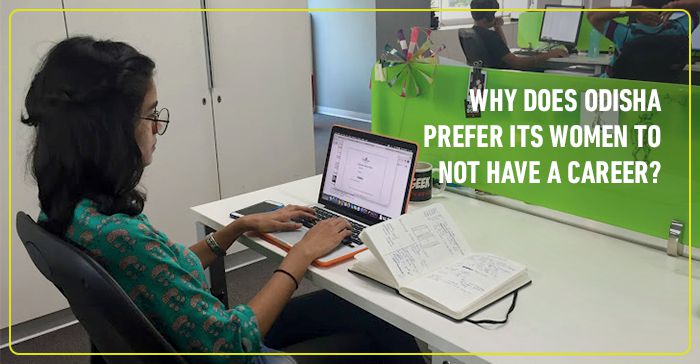5 Reasons why women in Odisha do not work after marriage

How does a society become instrumental in encouraging its women to pursue their career aspirations? While this question is vital anywhere, it is especially significant to be asked and addressed in the case of Odisha.
Odisha is one of the most unfavourable places for women's development, as is evident from the participation of women in workforce (27.16%)*, and from existing regressive practices like dowry, child marriage and high girl child dropout rates.** How is it possible for women to feel encouraged to be independent and have a successful career in such a society?
We asked a few people in Odisha about the way their society looked at women having a career and economic independence. They made some very strong points about expectations from women in the society and within a family, and they also pointed out that these problems are not exclusive to Odisha. Here’s are a few views shared by them:
1. A woman may work, but not at the cost of household and familial responsibilities

"The expectations (from a working woman) are more. You have to always juggle between being a good daughter-in-law and being a good professional. Women experience a burnout because of not being able to manage everything, and thereby carry a sense of guilt. We have to make sure we cook in the morning, send everyone off to office / school, take our own tiffin, make sure everything is ready for dinner, then go to office and work there, then while coming back we have to collect children, groceries, household supplies, etcetera, and then get home to cook. I don't think most men do that at all.They just go their office and come home where they may or may not participate in the household responsibilities."
2. A woman must ensure that she performs well as a bahu (daughter-in-law), even though she does not perform well professionally.

“Bias against women is not specific to Odisha. Everywhere we see that women are primarily looked at as mothers and daughter-in-laws. For a woman it does not matter if she does well at work, but it is very important that she does well as a family woman. Nowadays men do help with housework but it is expected from women to take care of family members, guests, etc., whereas a man doesn’t have to do that.”
3. A woman’s profession and her colleagues need to be approved by family members before allowing a woman to work

"The perceptions of in-laws have changed to an extent that they will allow the daughters-in-law to work but they have to perform their main role of cooking and caring for the family. They say - 'you go to office, but come back earlier, before your husband comes. Also, you should not sit beside your male colleagues.' Even the profession is selected by in-laws. While looking for a girl they prefer someone in professions like teaching where there are holidays and a pre-set work timing. Women like us in other professions struggle. To make up for the time we spend in office, we have to work extra hard at home to convince them that we are good daughters-in-law."
4. A man helping a woman in household chores is not appreciated

“If a husband helps with household chores and with babycare, the mother-in-law does not appreciate it because she thinks it is a woman’s responsibility - it doesn’t matter whether she has a job or doesn’t. You just have to continue as an ideal an ideal wife.”
"Even bringing up a child is entirely a woman's responsibility. It doesn't matter that there are other family members staying with the child while the mother goes to work, the mother has to ensure that even the clothes a child has to wear after school is kept ready. While at work she, she is expected to enquire if the child has eaten or is well. The father is not expected to fulfil any of these responsibilities."
5. Women do not have economic independence, even if they earn

"Even if a woman has money, her expenses are always calculated and she has to account for it, but this does not apply to a man. He can spend his money as he wishes. This gives men a sense of belief that their decision is right, and the wives should agree with them. There is no concept of mutual decision. When it comes to equality, people think about biological differences and say equality does not make sense. They never understand that gender equality is about equal respect and opportunities."
Being a career woman in Odisha (and in many other places) has been a matter of constant struggle against the society. Going out into the world does not replace the conventional role that the society expects its women to already play, and this added pressure further discourages women from working.
People in Odisha believe that the conditions of women are changing, albeit slowly, and they have pointed out specific steps like gender sensitisation, facilitating education for girls, and greater employment options for women, to tackle women's issues in the state. Read more about the condition of women in India here
How do you think can Odisha, and India can overcome gender bias in society? Have you experienced or come across any such challenges working women face? Write to us at jaagorein@gmail.com or tweet to us with @JaagoRe. You can also share your views on our Facebook page - JaagoRe
Sources
*Ministry of Statistics and Programme Implementation
**New Indian Express
Child Marriage in India - An analysis of available data, UNICEF
Share this story on





